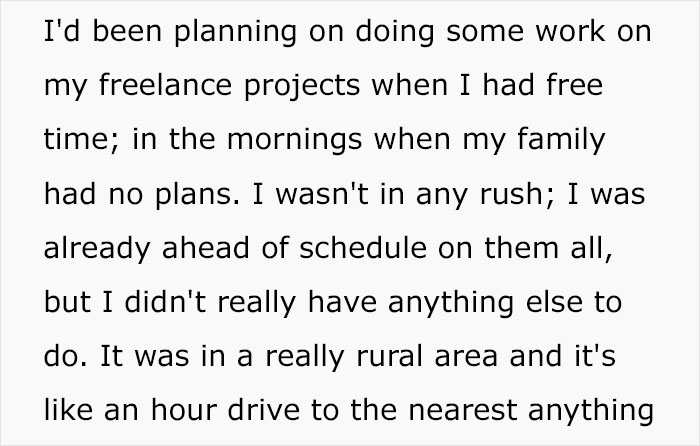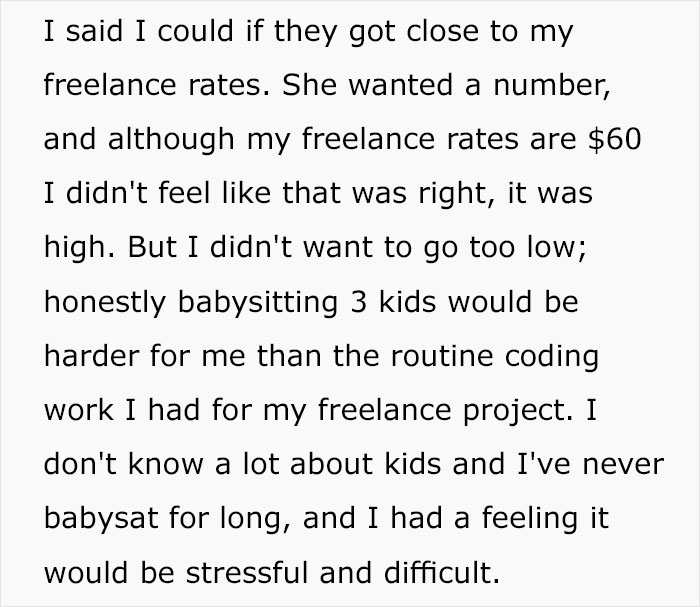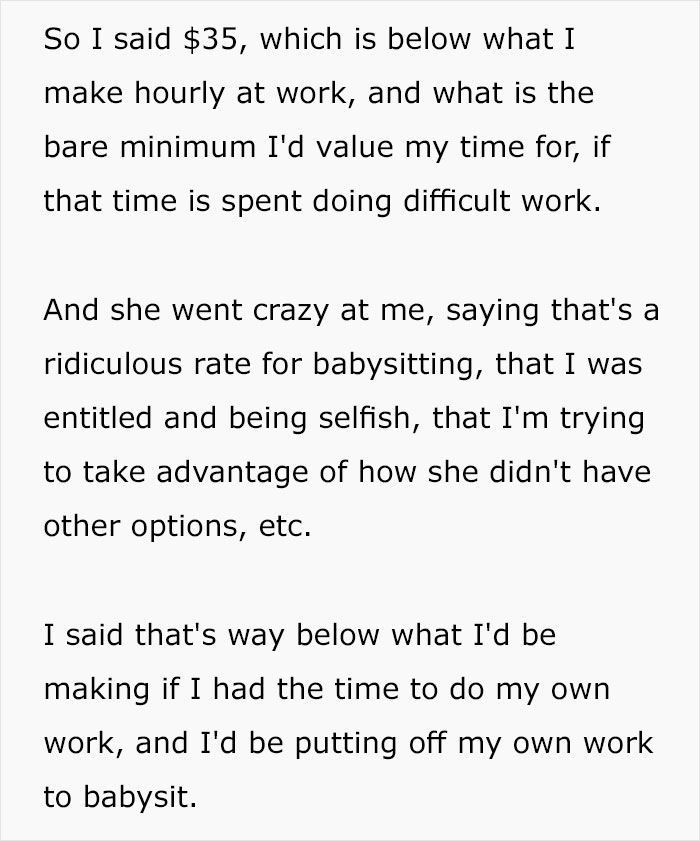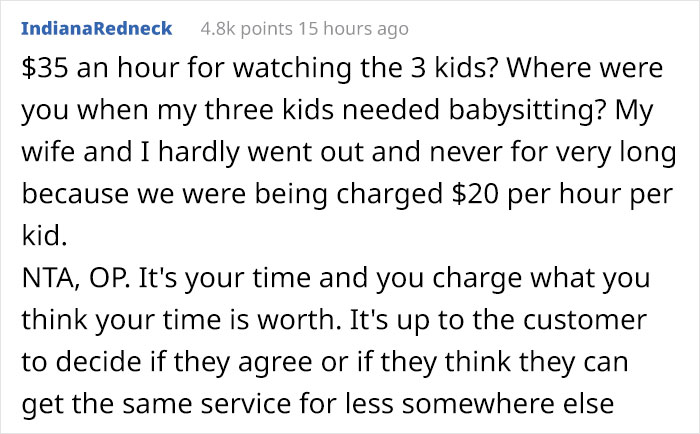
Parents Get Mad At Woman After She Asks $35/Hour To Babysit Their 3 Children
Time is money. So when redditor HENNYDEFN was asked by her cousin to babysit their 3 kids, the 24-year-old immediately thought of the freelance work she would have to sacrifice for it. Because of that, she wanted to get paid. $35 an hour. But it made her cousin “go crazy.” The feud left HENNYDEFN confused — was she supposed to ask for less money? Or maybe she should’ve done it for free? Or perhaps the cousin is the one who’s being unreasonable because she only thought of herself? Looking for answers, HENNYDEFN told the entire story on reddit, asking whether or not she was the asshole. Continue scrolling to learn about the whole situation and let us know your verdict in the comments.
If you end up in a similar situation, you don’t need to go to Dr. Phil to settle it. Aldo Civico, a Ph.D. with over 25 years of experience in leadership development and conflict management, says you can do it yourself in just three steps.
Firstly, consider your own perspective. “This … requires you to achieve a higher degree of self-awareness. You do so by asking yourself what’s really bothering you,” Civico wrote on Psychology Today. “What pain are you trying to avoid? What are you protecting yourself from? Through the emotions and the behavior you are displaying, what needs are you trying to satisfy? Are you looking to be significant to the other? Or to feel secure? Are you trying to connect with the other, or to feel connected with yourself (especially if you feel down, sad, or depressed)?”
Go deep and clarify to yourself what the conflict is really about. “In fact, chances are that while the fight is about a specific issue, in reality, you are after something that lies at a deeper level. What is it? Get clarity, and you will be able to come up with different options on how you can get what you really want.”
When you get this done, think about the other’s perspective. It’s just as important as your own. “It requires you to have empathy and through empathy to widen your understanding of what’s really going on. Put yourself in the shoes of the other. For a moment, suspend your own judgment and do your best to see the situation you’re confronting from the perspective of the other.”
Here are some of the questions you can ask yourself to find the answers you are looking for: what might influence the position taken by the other? What experiences shape his or her understanding? What’s going on in the life of the other? What needs is she or he satisfying with a particular behavior? Is the other looking for significance? Or rather for love and connection? Is it a way to feel secure? What’s the real intention of the other party?
Finally, get the third party’s perspective. “Often, someone from the outside can give us a fresh perspective about a problem you are trying to resolve,” Civico explained. “In this step, you put yourself in the position of a third party observing the situation you are involved in. Imagine you’re sitting in a movie theatre, watching your conflict projected on a screen as if it were a movie. What is it all about?”
Seeing the situation through three different lenses should allow you to get necessary emotional detachment, gain valuable insight, and to have a broader and deeper understanding of the conflict, necessary for resolving it.
People thought the girl wasn’t to blame
124Kviews
Share on FacebookDon't you know that because you're family, it should have been done for FREE?! Nah..you did right, they did wrong! 3 DAYS..REALLY 3 DAYS! It looks like THEY were the ones trying to take advantage of you. You stand your ground.
But, but... She's female! That means that she should be tripping over herself for the chance to spend time caring for children! /sarc
Load More Replies...I hate it when people think that just because we are women we want to take care of children and should be grateful for the opportunity. I went through this just this past holiday when, because I was off work (vacation time from my demanding job) I was told that I should keep my aunt and uncle's grandkids. I flat out said no and was told I was selfish and ungrateful and a b***h. Here is the deal: 1) it is my vacation, too 2) I didn't have kids because I don't want to care for them 3) I am not obligated to anyone because they are family and I have time off of work.
She just should have said no, she’d be losing too much money. $35 an hour for 3 days is pushing $1,000, I wouldn’t want to pay a family member a months rent for babysitting. She should have just said she can’t, and the parents should have made plans ahead of time.
No kidding - I LIKE doing math for a living and you still have to pay me for my time. I don't like dealing with kids. You want me to do that job it's going to cost you. The parent's lack of planning is not OPs problem.
Load More Replies...First off 24 yr old isnt a girl...she is an adult. Second ..children are your responsibility..your choice..you birthed them. Third 35 buvks an hr is cheap for 3 kids
Victoria Swift. Can’t half tell you have kids with all that entitlement you ooze. Your inability to follow the instructions in your box of birth control isn’t anyone else’s problem. Take responsibility for what you drop or keep your legs crossed
Load More Replies...Couple hours for free max for family you're not super close to, unless it is a real emergency. And even that's pushing it. Also the instant the husband called her a girl her rate should have been $60 per hr.
I watched with a smile on my face as my SIL (different one from previously mentioned) told her mother that she was going to bring my nephew by on Saturday for them to look after. Her mother looked at her firmly and said a flat out "No." My SIL was taken by surprise and asked why. Her mother replied "Your father and I being retired doesn't translate to automatic free babysitters for you. We like to have an occasional weekend free too. We earned it" and her mother walked away shaking her head. I can count on one hand the number of times my mother watched my son in the 28 years he's been alive. And two of those times, I paid her. I never expected my family to do it for free. The only times I didn't pay was because they offered to do it to give me a break or because they wanted to take him to an event.
Load More Replies...When I went to visit my MIL for 3 weeks during Christmas, it involved meeting my SIL and her 2 kids for the first time. Every outing seemed to have the whole family. And every outing involved my SIL ignoring her 2 kids and foisting looking after them on everyone else. It had been 5 years since my husband had been home. I finally planted a firm foot and said I wanted one day out. Just me, my husband, and my son (10 yrs old). My MIL seemed miffed but gave us the keys to her car which we took to Williamsburg, VA. That was the best outing we'd had all vacation. Sometimes family can act like everyone is a babysitter just waiting to watch their kids with baited breath. You had them, you watch them. It's not my responsibility to watch anyone but my own kid.
Nope, and don't feel bad about any of it besides their selfish and flat out mean behavior. If Mom don't like it why isn't she babysitting it's her grandkids... And it's the holidays were people get a moment to relax for once. You seem to have it together better than most people I know at 50 never mind being 24 and being where you are in life, that's hard work and dedication... Also three kids is no joke and since you don't know their Normal routine they will run you ragged.. tell you "mom lets me or I always do this or eat that, then find out one likes to bath with peanut butter and the little one throws leggos into peanut butter kid.... Your not the a*****e
Amen! It took me until nearly 50 to realize this type of behavior is psychological abuse. IDK what the relationship is between this women, her parents and her cousins but it is clearly dysfunctional. It is especiallu sad that her own mother sided with the cousins over her own daughter. Not cool. Find another place to visit next holiday - someplace where you, your time and your space are honored and respected. Also, check your hourly rate - it seems low. https://www.codementor.io/freelance-rates/?ref=producthunt
Load More Replies...Hells teeth, if wanted to spend time with adult friends and my 4 year old was not welcome I would not spend time with those friends. Why would I want to go anywhere for days without him? Yeah we all need some me time, but I normally find a couple of hours is enough, I start to miss him after that.
Same here, I don't like being away from my kids for too long, especially not 3 days! Also that would be very hard on the kids too, especially at Christmas. The whole family sounds disfunctional.
Load More Replies..."Her husband then got mad at me, saying that I'm a 24 year old girl..." Anyone who thinks a 24 year old WOMAN is still a "girl" deserves to be shut down hard. You can bet they wouldn't have expected a 24 year old MAN to take time out of his paid work schedule to babysit for free or very little.
So.... they wanted you sacrifice 3 days of your vacation > so they can have their vacation... right?
Well, TBF it's two of them (and one of them is a MAN) and only one of her (and she is merely a girl) so it's like six days for them, plus she doesn't have a MAN so really, is not like she is spending her time in anything important. *rolls eyes*
Load More Replies...Just because "they" did not acquire a skill set that allows them to be worth $60 an hour is NOT the young woman's fault. She gave them a bargain rate at $35. I would have charged them $60 per hour as a daytime rate and then an additional $10 per child for overnight responsibilities. Not only did they not value the young woman, they did not value their children enough to ensure they had quality care.
She is not an a*****e, she is putting down work she would be doing for 60/hour and any babysitter would charge more than 35 for taking care of three kids during three days, that is hard work!!!
It was $35 an hour... but still not *that* far off what a professional babysitter would charge for caring for three children over three days.
Load More Replies...Well I understand both sides. I did baby sitting for my sister for free. On the other hand if someone told me that my time has no value I'd advise jim to kiss my @ss.
I believe that the rate you asked for is totally in line with the norm. If your cousin and her husband have an issue with that, then that is their problem. If they don't want to pay it well then they should take care of their own kids. Your cousin and her husband are the one's that are acting "entitled" not you. You have a good business head on your shoulders and you will really go places in life. I commend you for sticking to your guns.
Wow where do you live? Here in Vancouver it is $40 for a day. We have a nanny who watches our 2 kids for $15 an hour, but we pay her under the table so she doesn't have to worry about taxes.
Load More Replies...would the mum asked a *male* relative to take time off of work, and *lose money*, to take care of her kids? The answer to that, will reveal a lot about the real dynamic here
The issue is she said herself she's not good with kids and doesn't babysit for long. I'd just straight up be like nah I don't want to or like babysitting and would rather value my time better by freelancing. If they get pissed then tell them they should have thought about it not asked last minute not to mention the mum and dad that could have babysat
I wonder how much of his rant had to do with the fact that a 24-year-old woman is making more money per hour than he is?
Since the kids' mom & dad are pissed, and now her parents . . . there's no reason to stay at this holiday gathering. Obviously no one values your time or what you think so take it elsewhere. Whatever you do on your holiday is your business, not for anyone to set your schedule and certainly NOT set your pay. Next time send a card, or an email or small gifts . . . you will probably not be missed. Why bother to try to charm those who will NEVER value you and what you do. Happy Holidays somewhere else! You've EARNED IT!
beggars choosers again. value your time and yourself and don't let them get you down!
The cousin, who calls the girl 'entitled', feels entitled to 3 full days of babysitting 3 children for nothing or close to it? I don't think she understands the definition of entitlement. The OP isn't TA, but knowing that the cousin would probably lose their mind over that rate (you could see that coming a mile away), I would have just said no, that I had work to do and stuck to that. Your lack of birth control does not make it my problem when you want to be child-free for a few days, especially over a holiday period. It was a pretty ballsy ask. If it was one day, I would have said it would have been nice to do as a big favor, but 3 is way out of line.
It soudns like the mother was offering the services of her daughter. In the sort of 'Oh, I'm sure xyz will step in, sort of thing'. I'd have been mad as fire, though, if someone tells me I'm a stupid little girl when I am a sought after freelancer that make 60€ an hour. (And software engienering is not done in a few hours). And hwo the hell, want to lea ve their kids behind, short notice, for three whole days??? That sort of thing is planned aeons in advance!
I think they should have already had a sitter in place. If they wanted to go away with adults only maybe they shouldn't have had kids. You were not unreasonable at all! Taking care of 3 kids is hard especially if you have no experience. Stick to your freelance job and immediately bow out if it ever comes up again.
I read the whole post, but really couldn't get past, "visit friends, who live in the area, for 3 days, without kids"..screams P**s Poor Parenting, "can't do it sorry", end of conversation.. Then I picture just how attention starved the kids are, but than I think, "why is this in a public forum for debate?", it's nunmybiz!
... and HERE is the issue I have with all the media bs and pressure from others of "It's FAMILY... you do it because it's FAMILY... don't you appreciate FAMILY?" - The only thing I've learned is that Family is an "F" word used as an excuse to freely abuse you. Think of **any** situation of abuse. Anything. "Oh well, they're family... you can deal with it for them, right?"... "it's FAMILY... they're priceless, right? So what's a few hundred dollars your missing?" - so you know what this triggers the a**holes in the "FAMILY" to do? Use it like a damned weapon. "Well, obviously they'll do anything for me, it's not unreasonable because it's FAMILY"... Yes, we treasure FAMILY sooo much that it's common practice to treat family worse than anyone else you encounter.
Damn 60 dollars an hour for your freelance work. Glad you didn't give that up.
IF she had to give up highly-paid work to do it, then she should be compensated something. As it's cash that won't be reported and taxed, and as it's her cousin for whom she's doing it, she should work for the market rate of babysitters (for three kids).
I think the larger issue is how much we undervalue childcare and low ball the cost of those who do it
This whole situation is absurd. Pay family to babysit? Stay away for full three days when you have small children merely for the reason to not spent time with them? Valuying the time of younger humans less than that of older ones? Frankly, all the main people involved here should overthink their values and aspirations. Life isn#t measured in hourly rates, particularly not the care for children, as any good mother and father will confirm.
Sometimes an adult needs to get away from kids, and spend time with other adults. I knew it was time when the music in my head was all rhyming tunes. With that said. a couple of hours is all that is needed, and I usually did it in the eve, when the little ones were sleeping. A good parent will also tell you that to be a good parent you can not forget you are a person, not just a parent.
Load More Replies...My ex-husband got frustrated when our then teenage daughter didn't want to babysit her much younger half siblings. She had no experience with children, and no interest in babysitting. He thought that because she was a girl, she would be a natural at it.
TBH $35 an hour is ridiculous. Nannies don't even charge that much, and they're professionals. A more realistic number would have been $20-$25 an hour. That being said, your relatives sound like real jerks the way they reacted. Insulting you is crossing a line. From now on just tell them no. And they were pretty dumb to leave such a thought to last second. They should just take their kids along
They were hoping to inconvenience you so they could get some adult only time. If adult only time is so important you have 2 options. Pay the rate given or not have kids
I love it when people use social media to destroy their family relationships
As a nanny for affluent families, I don't know what to make of this post. And all the commenters. Because, no, people do NOT pay more than $35/hr for three kids, unless they're mega-wealthy celebrities. My families have been doctors, surgeons, hospital administrators, and I've interviewed with many more families who just couldn't (as in wouldn't)meet my asking price. Which is nowhere near that range. And of course people are not going to pay what you are worth. They are going to pay for the work you're doing. When the economy crashed and business professionals, lawyers, and professors were out of jobs and went to work at McDonald's or CVS as cashiers, did they get paid what they were worth? No. They got paid minimum wage, because that was the job.
But shes not out of her job. It's like asking an actively employed lawyer/professor to babysit instead of working their normal job. I wouldn't expect my lawyer to babysit for $15 per hour, why would they ever agree to that.
Load More Replies...The cousin and her husband are entitled brats. I'm disappointed the LW mom didn't support her. What about her vacation and right to occupy herself as she so chooses. Look down the road 16 years and they'll be expecting her to donate toward the children's college educations or expecting more of granny's will because they reproduced.
They were expecting her to just drop everything and watch their kids and they call her selfish? They were staying with the woman's parents instead of at a hotel and probably ate the majority of their meals at the house, right? I'm surprised these entitled jerks didn't ask for gas money to get there seeing as how they seem to think the world revolves around them and EVERYONE should prostrating themselves just to be in their presence. The saddest part of this whole story is that the woman questioned if she was in the a*****e.
I think it's an a*****e move to charge family. Either do it for free out of loyalty for family or say no you can't do it. Doing something for family isn't business, it's teamwork. Even if I think a family member should have planned better, I'm not going to abandon them for it. Family is more valuable than any thing. That said, it's also an a*****e move to respond the way you say they did. Basically no one in this seems to value the other people in their family. If you ignore the family angle, then sure charge whatever you like and then the original poster didn't do anything wrong. If my cousin quoted me that rate, I'd decline and them assume they don't want to be my cousin anymore.
I guess it all depends on the family, eh, Tim? I personally think her family had a HELL of a nerve to even ask her! And, after she had told them she had freelance work to do, they should have withdrawn their request and perhaps asked the grandparents instead. This woman was totally within her rights - Way to stand up for yourself!
Load More Replies...Wow, I need to start baby sitting if you people really would pay 2500 bucks for me to watch ur kids for 3 days, retired military police and I have my emt and first responder, maybe I can charge 60 a hour for a 3 day vacation, I’ll gladly take 4300 dollars to watch 3 kids for 3 days, I’ll even fly anywhere in the world next day notice for that kinda money
Glad you walked away. You were the only adult in this situation. There are others around, why didn't they offer to do it or at least help? To make this anyone's fault but theirs is wrong. They didn't seem to care if anyone was qualified either, meaning they are willing to dump their precious children with anyone to get away. Some people shouldn't be parents.
First of all your 24 Years of age with an amazing job making 40/Hr and on top of that have a side hustle freelancing for 60/ Hr ... I want to commend you on this at your age . Second your time is what you feel It is worth , for your cousin to assume that you are asking such an amount is astronomical is ridiculous . Her husband calling you child and insulting you is more about his inability to recognize that your a women with standards , and recognizing your worth . Family thinks because your blood than your time is a given for free or cheap ..... absolutely not !!!!! I personal am paid twenty dollars an hour per child and depending on kids I do it at a group rate ( but ) .... its at a reasonable rate 3 kids ( all day ) rate 35-40 hour . It’s sad they feel your rate doesn’t equal your worth . I would just say I’m truly sorry but I hope you find someone who can work around your rate . Family can be so blood sucking and manipulating. Uughhhh family !!!!
If you want to spend time being an "adult" with your "adult friends", and don't want anything to get in your way, don't have kids. Yes, parents are entitled to a break, but unless someone offers to look after your kids for free, be the adult you think you are, and pay up, fool.
I don't think this gal was out of line at all. Where were they allowing her to have plans to spend time with adults and not have kids to watch after? The husbands comment was completely ludicrous. Go hire a kid, who believe me is not going to go for the $2.00 an hour or so these two think is fair. They should never even have imposed upon a family member. Which always seems to equate to free. They should have planned ahead and not treated this gal like she's some dufus kid. Let hubby stay home with his kids and see why the wife wanted a break. He sounds like someone clueless to what watching kids for real means. And I'm sure his hourly rate would be exorbitant.
I would refer you to the poem This Be The Verse By Philip Larkin - https://web.cs.dal.ca/~johnston/poetry/theverse.html
Mm you are "kid" and "brat".. And what els... And he is asking still you watching 3 young kids... I want to ask what kindof parents could leave kids so many days like that... -.-
totally nta. You came to me. You want something FROM me. This what I require to do what YOU want. You're not ready to provide it, go some where else. You think should do it for less? Then maybe lead your negotiations with something better than how stupid and childish I am. Because insulting someone certainly makes them want to work with you!
I agree with the young lady, the cousin and her husband had the children, now live with it. The parents are responsible for taking care of their own offspring, I sure would not have been tied down for 3 days with 3 children while the parents went off partying or whatever.
I don't know any parents who leave their three kids at once for three days.
$15/hour? I'd have said OK, I'll adjust my price…to $15/hour/child: that'll be $45/hour, you like that better?
My sister charges $30/hr on care.com and plenty of families pay it. It is the bay area, though..
I've been a hairstylist for over 10 years now. Everyone pays me. Everyone from friends, to family, to everything in between. Same rates, same quality of job, same everything flat across the board. I've have them tell me that they can get it done for cheaper, I tell them to have fun, cause I always end up fixing it. Never feel pressured or guilty for valuing your time, experience, knowledge, and workmanship. Also, boo on the mom and dad for shaming her and calling her dumb, that's hella toxic.
Mad about what? She could ask $300 ph if she wanted to and they still have no right to be mad at her. It's not like they had an emergency and she exploited it. Have these people ever heard of the word 'negotiation'? If they think the price is not right, talk about it like a a normal person would do. Last thing, being a parent myself, $35 ph for looking after 3 kids ALONE is a bargain for god sake
Even if you are an surgeon you could take care of member of family for free. In my country it’s very common to take care for each other and make favors(sometimes time consuming) for free. I feel pity that you can rely on each other only when it will be shared on social networks.
Good on you for valuing your time properly. You didn't choose to have kids, they did. Offer them $35 an hour to do your work which you sell on for $60 an hour; except they can't do it. Had they offered to do something for you in return it would have been more reasonable.
Day rate is based on knowledge you acquired and money and experience you spent on learn it. (and equipment you may be needed) Yes, babysitting rate is below software coding rate. You can always do a favor and work for less as soon at it do not impact your existing work engagements. If it's too complicated for these parents to understand that; you have no time to loose explaining them. For your sanity, stay with people having a brain.
Definitely NTA! I'm sorry it made her doubt herself so much. I hope all the affirmative answers she got confirmed her opinion so she can continue to make good decisions.
Someone asking me for a favor and calling me names would hear the phone going dead in their ear.
I don't understand. A software engineer that only makes 40$ an hour? A genuine educated engineer? I make the equivelant of 60$ as a measly IT-supporter.
MORE INFO NEEDED: ages of kids, economic status of cousin, does she like the kids and the cousin... I would have asked if cousin had a budget and factored in whether or not I could work while watching the kids.
First of all it's not just their Christmas holiday, it's hers too. Second, she is giving up her own time. She should how them a pay slip or invoice showing how much she earns on a daily basis and tell them not only to match that but as its Christmas she will be charging triple rates! Even after all that I would say that they are the a******s because they had the kids and they should be spending Christmas with their kids. Anyway, why can't they take them with them?
Even the writer here was ignorant and referred to her as a girl.
It's Christmas- why not just help out a little? Believe me, you get what you give.
The lady should've just said no and let it be if its too high of a price for her. She was looking for a cheap way out. Plus the lady (im 24 too, definitely not a girl anymore lol) already said she has work to do and coulda left it at that.
Family bonds are a currency worth more than money IF your family member has good "credit" with you. Have they helped you for free? Do you value a close relationship with those kids or consider playing with them fun? I am a professional child psychologist and I will babysit close family for free...but I LOVE kids & have fun. I would never do tech work for free because it's hard. Consider offering free babysitting for 2 hours, a reasonable "bonding time" so you can earn better family credit. Think of favors they can do in exchange. For example, if YOU have kids one day...
In Bulgaria we NEVER charge family. Never. It will be shame. If you need the money/work it will be better to say No. Taking daycare for 3 days 900-1000 is insane.
Was she an a*s asking $35 an hour for babysitting? Absolutely. When your family is asking you to babysit and you can't just say No and move on. Nobody would have been offended if she just said "Sorry, I have a lot of work to do."
I am also a freelancer, webdeveloper. My hour rate is 40€. But if my sister need to babysit her 2 kids, for week holiday, me and me wife do it for free :D Also my sister will babysit our kids for free. Of course agreed in advance, but i never ask my family for money. Maybe we are just a normal european family and not capitalist bussinesmen :D
The cousins were the ones who suggested paying the OP and asked her to name her rate. So try again with your European self-righteousness. Also, your situation is completely different (a) the OP has no children of her own, so there is no bartering like you and your sister do (another hole in your capitalism argument) and (b) OP's situation involved her cousins, not siblings. I'm going on vacation for 10 days. When should I drop off my dog, cats, rabbits and two goats for you to look after while I'm gone?
Load More Replies...What a horrible husband! Good husbands might disagree with you regarding YOUR employment, but they recognize that it’s YOUR choice. If he thinks it’s a good babysitting deal he should do it.
It wasn't her husband, it was the cousin's - the father of the children.
Load More Replies...I think you should have helped out family, raising 3 kids cants be cheap and asking for 2500 dollars to watch family for 3 days to help out so they could have a break for once is insane, you act like you couldn’t get any work done while watching them so you also planned to double dip and make up to 100 a hour just to help out a family member and watch your own blood? I’m glad my family loves each other and wants to help out
But they AREN'T her kids, nor HER RESPONSIBILITY. Her work WAS, which she would not have been able to do chasing after 3 young children - you obviously have never had to watch 3 kids or you'd KNOW she wasn't able to double-dip. STOP making this invalid point. And please remember that her cousin wanted the children, NOT her. I am a banker without children and just because my siblings have them, doesn't make ME responsible for their welfare. That being said, when I was between jobs for a few weeks I took care of my 3 year old nephew while my newly divorced brother went to Ireland (NO - I didn't charge, but I wish I had, now, I ended up starting a new position totally exhausted!) I also took care of my parents in their failing years while my sibs couldn't be bothered to even VISIT them! So no, "FAMILY" is NOT some sort of "anything and everything if it's FAMILY" FAMILY are LEACHES who expect the rest of their family to pay for their decisions.
Load More Replies...But watching 3 children around the clock for 3 days? This is a substantial amount of work here.
Load More Replies...The cousins were the ones who initially offered to pay and asked her rate. She merely told them. They didn't ask for a freebie and then she demanded payment. Reading comprehension, dude.
Load More Replies...A favor is watching 3 kids for an hour... not 3 days. And most certainly not 3 days of your own vacation.
Load More Replies...Oh.. I'm pretty sure trying to watch 3 kids (for 3 days) is not going to leave her much time to do anything - including relax on - her - vacation. I know, since I am a mom of five.
Load More Replies...This is her vacation with her family... why should she have to bargain away her one opportunity to spend quality time with her family so this couple can take off and dump their 3 kids on her for 3 days? She literally will lose 3 full days of her vacation. To me, that should cost the couple.. because it's a pretty polite way of nudging in the "No" w/o giving them room to beg.
Load More Replies...So this family goes to visit and stay with another family member with their three kids. But they want to leave - and go stay with other friends > while.. leaving their three kids behind. Pretty sure this is who is being selfish, not the person they want to give up 3 full days of their own vacation to babysit their 3 kids for them.
Load More Replies...So.. someone wants you to "give up" three full days of your vacation time... time you took to travel home to stay with family... to catch up... spend time together. Do you think it's valid she give up three full days (and nights) watching these children so the parents can go off and have a "better vacation" w/o them? This is something they should have arranged in advance.
Load More Replies...Don't you know that because you're family, it should have been done for FREE?! Nah..you did right, they did wrong! 3 DAYS..REALLY 3 DAYS! It looks like THEY were the ones trying to take advantage of you. You stand your ground.
But, but... She's female! That means that she should be tripping over herself for the chance to spend time caring for children! /sarc
Load More Replies...I hate it when people think that just because we are women we want to take care of children and should be grateful for the opportunity. I went through this just this past holiday when, because I was off work (vacation time from my demanding job) I was told that I should keep my aunt and uncle's grandkids. I flat out said no and was told I was selfish and ungrateful and a b***h. Here is the deal: 1) it is my vacation, too 2) I didn't have kids because I don't want to care for them 3) I am not obligated to anyone because they are family and I have time off of work.
She just should have said no, she’d be losing too much money. $35 an hour for 3 days is pushing $1,000, I wouldn’t want to pay a family member a months rent for babysitting. She should have just said she can’t, and the parents should have made plans ahead of time.
No kidding - I LIKE doing math for a living and you still have to pay me for my time. I don't like dealing with kids. You want me to do that job it's going to cost you. The parent's lack of planning is not OPs problem.
Load More Replies...First off 24 yr old isnt a girl...she is an adult. Second ..children are your responsibility..your choice..you birthed them. Third 35 buvks an hr is cheap for 3 kids
Victoria Swift. Can’t half tell you have kids with all that entitlement you ooze. Your inability to follow the instructions in your box of birth control isn’t anyone else’s problem. Take responsibility for what you drop or keep your legs crossed
Load More Replies...Couple hours for free max for family you're not super close to, unless it is a real emergency. And even that's pushing it. Also the instant the husband called her a girl her rate should have been $60 per hr.
I watched with a smile on my face as my SIL (different one from previously mentioned) told her mother that she was going to bring my nephew by on Saturday for them to look after. Her mother looked at her firmly and said a flat out "No." My SIL was taken by surprise and asked why. Her mother replied "Your father and I being retired doesn't translate to automatic free babysitters for you. We like to have an occasional weekend free too. We earned it" and her mother walked away shaking her head. I can count on one hand the number of times my mother watched my son in the 28 years he's been alive. And two of those times, I paid her. I never expected my family to do it for free. The only times I didn't pay was because they offered to do it to give me a break or because they wanted to take him to an event.
Load More Replies...When I went to visit my MIL for 3 weeks during Christmas, it involved meeting my SIL and her 2 kids for the first time. Every outing seemed to have the whole family. And every outing involved my SIL ignoring her 2 kids and foisting looking after them on everyone else. It had been 5 years since my husband had been home. I finally planted a firm foot and said I wanted one day out. Just me, my husband, and my son (10 yrs old). My MIL seemed miffed but gave us the keys to her car which we took to Williamsburg, VA. That was the best outing we'd had all vacation. Sometimes family can act like everyone is a babysitter just waiting to watch their kids with baited breath. You had them, you watch them. It's not my responsibility to watch anyone but my own kid.
Nope, and don't feel bad about any of it besides their selfish and flat out mean behavior. If Mom don't like it why isn't she babysitting it's her grandkids... And it's the holidays were people get a moment to relax for once. You seem to have it together better than most people I know at 50 never mind being 24 and being where you are in life, that's hard work and dedication... Also three kids is no joke and since you don't know their Normal routine they will run you ragged.. tell you "mom lets me or I always do this or eat that, then find out one likes to bath with peanut butter and the little one throws leggos into peanut butter kid.... Your not the a*****e
Amen! It took me until nearly 50 to realize this type of behavior is psychological abuse. IDK what the relationship is between this women, her parents and her cousins but it is clearly dysfunctional. It is especiallu sad that her own mother sided with the cousins over her own daughter. Not cool. Find another place to visit next holiday - someplace where you, your time and your space are honored and respected. Also, check your hourly rate - it seems low. https://www.codementor.io/freelance-rates/?ref=producthunt
Load More Replies...Hells teeth, if wanted to spend time with adult friends and my 4 year old was not welcome I would not spend time with those friends. Why would I want to go anywhere for days without him? Yeah we all need some me time, but I normally find a couple of hours is enough, I start to miss him after that.
Same here, I don't like being away from my kids for too long, especially not 3 days! Also that would be very hard on the kids too, especially at Christmas. The whole family sounds disfunctional.
Load More Replies..."Her husband then got mad at me, saying that I'm a 24 year old girl..." Anyone who thinks a 24 year old WOMAN is still a "girl" deserves to be shut down hard. You can bet they wouldn't have expected a 24 year old MAN to take time out of his paid work schedule to babysit for free or very little.
So.... they wanted you sacrifice 3 days of your vacation > so they can have their vacation... right?
Well, TBF it's two of them (and one of them is a MAN) and only one of her (and she is merely a girl) so it's like six days for them, plus she doesn't have a MAN so really, is not like she is spending her time in anything important. *rolls eyes*
Load More Replies...Just because "they" did not acquire a skill set that allows them to be worth $60 an hour is NOT the young woman's fault. She gave them a bargain rate at $35. I would have charged them $60 per hour as a daytime rate and then an additional $10 per child for overnight responsibilities. Not only did they not value the young woman, they did not value their children enough to ensure they had quality care.
She is not an a*****e, she is putting down work she would be doing for 60/hour and any babysitter would charge more than 35 for taking care of three kids during three days, that is hard work!!!
It was $35 an hour... but still not *that* far off what a professional babysitter would charge for caring for three children over three days.
Load More Replies...Well I understand both sides. I did baby sitting for my sister for free. On the other hand if someone told me that my time has no value I'd advise jim to kiss my @ss.
I believe that the rate you asked for is totally in line with the norm. If your cousin and her husband have an issue with that, then that is their problem. If they don't want to pay it well then they should take care of their own kids. Your cousin and her husband are the one's that are acting "entitled" not you. You have a good business head on your shoulders and you will really go places in life. I commend you for sticking to your guns.
Wow where do you live? Here in Vancouver it is $40 for a day. We have a nanny who watches our 2 kids for $15 an hour, but we pay her under the table so she doesn't have to worry about taxes.
Load More Replies...would the mum asked a *male* relative to take time off of work, and *lose money*, to take care of her kids? The answer to that, will reveal a lot about the real dynamic here
The issue is she said herself she's not good with kids and doesn't babysit for long. I'd just straight up be like nah I don't want to or like babysitting and would rather value my time better by freelancing. If they get pissed then tell them they should have thought about it not asked last minute not to mention the mum and dad that could have babysat
I wonder how much of his rant had to do with the fact that a 24-year-old woman is making more money per hour than he is?
Since the kids' mom & dad are pissed, and now her parents . . . there's no reason to stay at this holiday gathering. Obviously no one values your time or what you think so take it elsewhere. Whatever you do on your holiday is your business, not for anyone to set your schedule and certainly NOT set your pay. Next time send a card, or an email or small gifts . . . you will probably not be missed. Why bother to try to charm those who will NEVER value you and what you do. Happy Holidays somewhere else! You've EARNED IT!
beggars choosers again. value your time and yourself and don't let them get you down!
The cousin, who calls the girl 'entitled', feels entitled to 3 full days of babysitting 3 children for nothing or close to it? I don't think she understands the definition of entitlement. The OP isn't TA, but knowing that the cousin would probably lose their mind over that rate (you could see that coming a mile away), I would have just said no, that I had work to do and stuck to that. Your lack of birth control does not make it my problem when you want to be child-free for a few days, especially over a holiday period. It was a pretty ballsy ask. If it was one day, I would have said it would have been nice to do as a big favor, but 3 is way out of line.
It soudns like the mother was offering the services of her daughter. In the sort of 'Oh, I'm sure xyz will step in, sort of thing'. I'd have been mad as fire, though, if someone tells me I'm a stupid little girl when I am a sought after freelancer that make 60€ an hour. (And software engienering is not done in a few hours). And hwo the hell, want to lea ve their kids behind, short notice, for three whole days??? That sort of thing is planned aeons in advance!
I think they should have already had a sitter in place. If they wanted to go away with adults only maybe they shouldn't have had kids. You were not unreasonable at all! Taking care of 3 kids is hard especially if you have no experience. Stick to your freelance job and immediately bow out if it ever comes up again.
I read the whole post, but really couldn't get past, "visit friends, who live in the area, for 3 days, without kids"..screams P**s Poor Parenting, "can't do it sorry", end of conversation.. Then I picture just how attention starved the kids are, but than I think, "why is this in a public forum for debate?", it's nunmybiz!
... and HERE is the issue I have with all the media bs and pressure from others of "It's FAMILY... you do it because it's FAMILY... don't you appreciate FAMILY?" - The only thing I've learned is that Family is an "F" word used as an excuse to freely abuse you. Think of **any** situation of abuse. Anything. "Oh well, they're family... you can deal with it for them, right?"... "it's FAMILY... they're priceless, right? So what's a few hundred dollars your missing?" - so you know what this triggers the a**holes in the "FAMILY" to do? Use it like a damned weapon. "Well, obviously they'll do anything for me, it's not unreasonable because it's FAMILY"... Yes, we treasure FAMILY sooo much that it's common practice to treat family worse than anyone else you encounter.
Damn 60 dollars an hour for your freelance work. Glad you didn't give that up.
IF she had to give up highly-paid work to do it, then she should be compensated something. As it's cash that won't be reported and taxed, and as it's her cousin for whom she's doing it, she should work for the market rate of babysitters (for three kids).
I think the larger issue is how much we undervalue childcare and low ball the cost of those who do it
This whole situation is absurd. Pay family to babysit? Stay away for full three days when you have small children merely for the reason to not spent time with them? Valuying the time of younger humans less than that of older ones? Frankly, all the main people involved here should overthink their values and aspirations. Life isn#t measured in hourly rates, particularly not the care for children, as any good mother and father will confirm.
Sometimes an adult needs to get away from kids, and spend time with other adults. I knew it was time when the music in my head was all rhyming tunes. With that said. a couple of hours is all that is needed, and I usually did it in the eve, when the little ones were sleeping. A good parent will also tell you that to be a good parent you can not forget you are a person, not just a parent.
Load More Replies...My ex-husband got frustrated when our then teenage daughter didn't want to babysit her much younger half siblings. She had no experience with children, and no interest in babysitting. He thought that because she was a girl, she would be a natural at it.
TBH $35 an hour is ridiculous. Nannies don't even charge that much, and they're professionals. A more realistic number would have been $20-$25 an hour. That being said, your relatives sound like real jerks the way they reacted. Insulting you is crossing a line. From now on just tell them no. And they were pretty dumb to leave such a thought to last second. They should just take their kids along
They were hoping to inconvenience you so they could get some adult only time. If adult only time is so important you have 2 options. Pay the rate given or not have kids
I love it when people use social media to destroy their family relationships
As a nanny for affluent families, I don't know what to make of this post. And all the commenters. Because, no, people do NOT pay more than $35/hr for three kids, unless they're mega-wealthy celebrities. My families have been doctors, surgeons, hospital administrators, and I've interviewed with many more families who just couldn't (as in wouldn't)meet my asking price. Which is nowhere near that range. And of course people are not going to pay what you are worth. They are going to pay for the work you're doing. When the economy crashed and business professionals, lawyers, and professors were out of jobs and went to work at McDonald's or CVS as cashiers, did they get paid what they were worth? No. They got paid minimum wage, because that was the job.
But shes not out of her job. It's like asking an actively employed lawyer/professor to babysit instead of working their normal job. I wouldn't expect my lawyer to babysit for $15 per hour, why would they ever agree to that.
Load More Replies...The cousin and her husband are entitled brats. I'm disappointed the LW mom didn't support her. What about her vacation and right to occupy herself as she so chooses. Look down the road 16 years and they'll be expecting her to donate toward the children's college educations or expecting more of granny's will because they reproduced.
They were expecting her to just drop everything and watch their kids and they call her selfish? They were staying with the woman's parents instead of at a hotel and probably ate the majority of their meals at the house, right? I'm surprised these entitled jerks didn't ask for gas money to get there seeing as how they seem to think the world revolves around them and EVERYONE should prostrating themselves just to be in their presence. The saddest part of this whole story is that the woman questioned if she was in the a*****e.
I think it's an a*****e move to charge family. Either do it for free out of loyalty for family or say no you can't do it. Doing something for family isn't business, it's teamwork. Even if I think a family member should have planned better, I'm not going to abandon them for it. Family is more valuable than any thing. That said, it's also an a*****e move to respond the way you say they did. Basically no one in this seems to value the other people in their family. If you ignore the family angle, then sure charge whatever you like and then the original poster didn't do anything wrong. If my cousin quoted me that rate, I'd decline and them assume they don't want to be my cousin anymore.
I guess it all depends on the family, eh, Tim? I personally think her family had a HELL of a nerve to even ask her! And, after she had told them she had freelance work to do, they should have withdrawn their request and perhaps asked the grandparents instead. This woman was totally within her rights - Way to stand up for yourself!
Load More Replies...Wow, I need to start baby sitting if you people really would pay 2500 bucks for me to watch ur kids for 3 days, retired military police and I have my emt and first responder, maybe I can charge 60 a hour for a 3 day vacation, I’ll gladly take 4300 dollars to watch 3 kids for 3 days, I’ll even fly anywhere in the world next day notice for that kinda money
Glad you walked away. You were the only adult in this situation. There are others around, why didn't they offer to do it or at least help? To make this anyone's fault but theirs is wrong. They didn't seem to care if anyone was qualified either, meaning they are willing to dump their precious children with anyone to get away. Some people shouldn't be parents.
First of all your 24 Years of age with an amazing job making 40/Hr and on top of that have a side hustle freelancing for 60/ Hr ... I want to commend you on this at your age . Second your time is what you feel It is worth , for your cousin to assume that you are asking such an amount is astronomical is ridiculous . Her husband calling you child and insulting you is more about his inability to recognize that your a women with standards , and recognizing your worth . Family thinks because your blood than your time is a given for free or cheap ..... absolutely not !!!!! I personal am paid twenty dollars an hour per child and depending on kids I do it at a group rate ( but ) .... its at a reasonable rate 3 kids ( all day ) rate 35-40 hour . It’s sad they feel your rate doesn’t equal your worth . I would just say I’m truly sorry but I hope you find someone who can work around your rate . Family can be so blood sucking and manipulating. Uughhhh family !!!!
If you want to spend time being an "adult" with your "adult friends", and don't want anything to get in your way, don't have kids. Yes, parents are entitled to a break, but unless someone offers to look after your kids for free, be the adult you think you are, and pay up, fool.
I don't think this gal was out of line at all. Where were they allowing her to have plans to spend time with adults and not have kids to watch after? The husbands comment was completely ludicrous. Go hire a kid, who believe me is not going to go for the $2.00 an hour or so these two think is fair. They should never even have imposed upon a family member. Which always seems to equate to free. They should have planned ahead and not treated this gal like she's some dufus kid. Let hubby stay home with his kids and see why the wife wanted a break. He sounds like someone clueless to what watching kids for real means. And I'm sure his hourly rate would be exorbitant.
I would refer you to the poem This Be The Verse By Philip Larkin - https://web.cs.dal.ca/~johnston/poetry/theverse.html
Mm you are "kid" and "brat".. And what els... And he is asking still you watching 3 young kids... I want to ask what kindof parents could leave kids so many days like that... -.-
totally nta. You came to me. You want something FROM me. This what I require to do what YOU want. You're not ready to provide it, go some where else. You think should do it for less? Then maybe lead your negotiations with something better than how stupid and childish I am. Because insulting someone certainly makes them want to work with you!
I agree with the young lady, the cousin and her husband had the children, now live with it. The parents are responsible for taking care of their own offspring, I sure would not have been tied down for 3 days with 3 children while the parents went off partying or whatever.
I don't know any parents who leave their three kids at once for three days.
$15/hour? I'd have said OK, I'll adjust my price…to $15/hour/child: that'll be $45/hour, you like that better?
My sister charges $30/hr on care.com and plenty of families pay it. It is the bay area, though..
I've been a hairstylist for over 10 years now. Everyone pays me. Everyone from friends, to family, to everything in between. Same rates, same quality of job, same everything flat across the board. I've have them tell me that they can get it done for cheaper, I tell them to have fun, cause I always end up fixing it. Never feel pressured or guilty for valuing your time, experience, knowledge, and workmanship. Also, boo on the mom and dad for shaming her and calling her dumb, that's hella toxic.
Mad about what? She could ask $300 ph if she wanted to and they still have no right to be mad at her. It's not like they had an emergency and she exploited it. Have these people ever heard of the word 'negotiation'? If they think the price is not right, talk about it like a a normal person would do. Last thing, being a parent myself, $35 ph for looking after 3 kids ALONE is a bargain for god sake
Even if you are an surgeon you could take care of member of family for free. In my country it’s very common to take care for each other and make favors(sometimes time consuming) for free. I feel pity that you can rely on each other only when it will be shared on social networks.
Good on you for valuing your time properly. You didn't choose to have kids, they did. Offer them $35 an hour to do your work which you sell on for $60 an hour; except they can't do it. Had they offered to do something for you in return it would have been more reasonable.
Day rate is based on knowledge you acquired and money and experience you spent on learn it. (and equipment you may be needed) Yes, babysitting rate is below software coding rate. You can always do a favor and work for less as soon at it do not impact your existing work engagements. If it's too complicated for these parents to understand that; you have no time to loose explaining them. For your sanity, stay with people having a brain.
Definitely NTA! I'm sorry it made her doubt herself so much. I hope all the affirmative answers she got confirmed her opinion so she can continue to make good decisions.
Someone asking me for a favor and calling me names would hear the phone going dead in their ear.
I don't understand. A software engineer that only makes 40$ an hour? A genuine educated engineer? I make the equivelant of 60$ as a measly IT-supporter.
MORE INFO NEEDED: ages of kids, economic status of cousin, does she like the kids and the cousin... I would have asked if cousin had a budget and factored in whether or not I could work while watching the kids.
First of all it's not just their Christmas holiday, it's hers too. Second, she is giving up her own time. She should how them a pay slip or invoice showing how much she earns on a daily basis and tell them not only to match that but as its Christmas she will be charging triple rates! Even after all that I would say that they are the a******s because they had the kids and they should be spending Christmas with their kids. Anyway, why can't they take them with them?
Even the writer here was ignorant and referred to her as a girl.
It's Christmas- why not just help out a little? Believe me, you get what you give.
The lady should've just said no and let it be if its too high of a price for her. She was looking for a cheap way out. Plus the lady (im 24 too, definitely not a girl anymore lol) already said she has work to do and coulda left it at that.
Family bonds are a currency worth more than money IF your family member has good "credit" with you. Have they helped you for free? Do you value a close relationship with those kids or consider playing with them fun? I am a professional child psychologist and I will babysit close family for free...but I LOVE kids & have fun. I would never do tech work for free because it's hard. Consider offering free babysitting for 2 hours, a reasonable "bonding time" so you can earn better family credit. Think of favors they can do in exchange. For example, if YOU have kids one day...
In Bulgaria we NEVER charge family. Never. It will be shame. If you need the money/work it will be better to say No. Taking daycare for 3 days 900-1000 is insane.
Was she an a*s asking $35 an hour for babysitting? Absolutely. When your family is asking you to babysit and you can't just say No and move on. Nobody would have been offended if she just said "Sorry, I have a lot of work to do."
I am also a freelancer, webdeveloper. My hour rate is 40€. But if my sister need to babysit her 2 kids, for week holiday, me and me wife do it for free :D Also my sister will babysit our kids for free. Of course agreed in advance, but i never ask my family for money. Maybe we are just a normal european family and not capitalist bussinesmen :D
The cousins were the ones who suggested paying the OP and asked her to name her rate. So try again with your European self-righteousness. Also, your situation is completely different (a) the OP has no children of her own, so there is no bartering like you and your sister do (another hole in your capitalism argument) and (b) OP's situation involved her cousins, not siblings. I'm going on vacation for 10 days. When should I drop off my dog, cats, rabbits and two goats for you to look after while I'm gone?
Load More Replies...What a horrible husband! Good husbands might disagree with you regarding YOUR employment, but they recognize that it’s YOUR choice. If he thinks it’s a good babysitting deal he should do it.
It wasn't her husband, it was the cousin's - the father of the children.
Load More Replies...I think you should have helped out family, raising 3 kids cants be cheap and asking for 2500 dollars to watch family for 3 days to help out so they could have a break for once is insane, you act like you couldn’t get any work done while watching them so you also planned to double dip and make up to 100 a hour just to help out a family member and watch your own blood? I’m glad my family loves each other and wants to help out
But they AREN'T her kids, nor HER RESPONSIBILITY. Her work WAS, which she would not have been able to do chasing after 3 young children - you obviously have never had to watch 3 kids or you'd KNOW she wasn't able to double-dip. STOP making this invalid point. And please remember that her cousin wanted the children, NOT her. I am a banker without children and just because my siblings have them, doesn't make ME responsible for their welfare. That being said, when I was between jobs for a few weeks I took care of my 3 year old nephew while my newly divorced brother went to Ireland (NO - I didn't charge, but I wish I had, now, I ended up starting a new position totally exhausted!) I also took care of my parents in their failing years while my sibs couldn't be bothered to even VISIT them! So no, "FAMILY" is NOT some sort of "anything and everything if it's FAMILY" FAMILY are LEACHES who expect the rest of their family to pay for their decisions.
Load More Replies...But watching 3 children around the clock for 3 days? This is a substantial amount of work here.
Load More Replies...The cousins were the ones who initially offered to pay and asked her rate. She merely told them. They didn't ask for a freebie and then she demanded payment. Reading comprehension, dude.
Load More Replies...A favor is watching 3 kids for an hour... not 3 days. And most certainly not 3 days of your own vacation.
Load More Replies...Oh.. I'm pretty sure trying to watch 3 kids (for 3 days) is not going to leave her much time to do anything - including relax on - her - vacation. I know, since I am a mom of five.
Load More Replies...This is her vacation with her family... why should she have to bargain away her one opportunity to spend quality time with her family so this couple can take off and dump their 3 kids on her for 3 days? She literally will lose 3 full days of her vacation. To me, that should cost the couple.. because it's a pretty polite way of nudging in the "No" w/o giving them room to beg.
Load More Replies...So this family goes to visit and stay with another family member with their three kids. But they want to leave - and go stay with other friends > while.. leaving their three kids behind. Pretty sure this is who is being selfish, not the person they want to give up 3 full days of their own vacation to babysit their 3 kids for them.
Load More Replies...So.. someone wants you to "give up" three full days of your vacation time... time you took to travel home to stay with family... to catch up... spend time together. Do you think it's valid she give up three full days (and nights) watching these children so the parents can go off and have a "better vacation" w/o them? This is something they should have arranged in advance.
Load More Replies...





















220
183